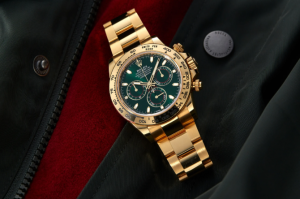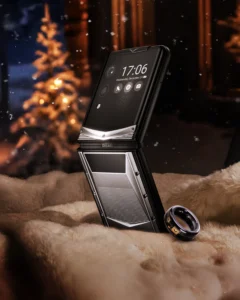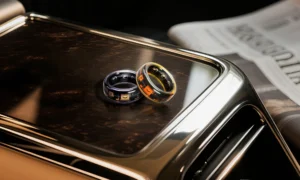In the relentless pursuit of success, the tools we wield can be as critical as the strategies we employ. Have you ever found yourself curious about the technology powering the decision-makers at the very pinnacle of American business? It's a question that sparks intrigue: What phone do top CEOs use? Are they all flocking to the latest iPhone, embracing the innovation of cutting-edge Android devices, or perhaps opting for something more specialized? This guide ventures beyond mere speculation to uncover the mobile devices favored by Fortune 500 leaders. We'll dissect their choices, understand the rationale behind them, and reveal how you can leverage these insights to elevate your own executive mobility and productivity in 2025. Prepare to discover the popular brands, the essential features they prioritize, and the strategic implications of their mobile technology choices, offering a glimpse into how security, efficiency, and forward-thinking tech adoption shape their daily operations.
The Executive's Choice: Unpacking CEO Mobile Device Preferences
When considering what phone do top CEOs use?, the answer often transcends simple brand loyalty. While the allure of premium devices is undeniable, executive mobile device selection is a calculated decision driven by a complex interplay of security, functionality, and integration. Top CEOs often prioritize robust security features, seamless integration with enterprise systems, and reliable performance over just brand trends. This strategic approach ensures their mobile devices are not just communication tools, but secure extensions of their critical business operations.
Beyond Brand Names: What Truly Drives CEO Phone Selection?
The primary drivers for CEOs are often rooted in practicality and security. The need for encrypted communication, secure data storage, and robust protection against cyber threats is paramount. Beyond this, seamless integration with existing enterprise resource planning (ERP) systems, customer relationship management (CRM) software, and other critical business applications is a significant factor. A device that can effortlessly sync calendars, emails, and important documents across a corporate network offers a substantial productivity advantage. Reliability and battery life are also non-negotiable, ensuring executives can stay connected and productive throughout demanding travel schedules and long workdays. Company policies and IT infrastructure play a significant role in dictating the mobile devices available and preferred within Fortune 500 companies, often guiding choices towards platforms that offer centralized management and enhanced security protocols.
| Feature/Consideration | High Priority for CEOs | Secondary Consideration |
|---|---|---|
| Security | Robust encryption, data protection | Basic password protection |
| Integration | Seamless enterprise system sync | Standalone app functionality |
| Performance | Reliable, fast processing | Moderate speed |
| Battery Life | All-day power | Rechargeable as needed |
| Brand Appeal | Can be a factor | Less critical than functionality |
The iPhone vs. Android Debate Among Top Executives
The perennial debate between iOS and Android continues within executive suites. While iPhones and high-end Android devices dominate, some leaders opt for specialized or niche devices for specific needs, reflecting a strategic approach to executive mobility. The iPhone's perceived ease of use, strong app ecosystem, and robust security updates often appeal to many. Conversely, Android's open nature and customization options, particularly on flagship models from manufacturers like Samsung, can be attractive for those requiring deeper integration or specific functionalities.
| Device Ecosystem | Strengths for Executives | Potential Drawbacks for Executives |
|---|---|---|
| iOS (iPhone) | Strong security, intuitive UI, vast app store | Less customization, closed ecosystem |
| Android (High-End) | High customization, open platform, hardware variety | Security can vary by manufacturer, fragmentation |
Are There Niche Brands Influencing Leaders in 2025?
While mainstream platforms hold sway, the landscape for what phone do top CEOs use? might see subtle shifts. As cybersecurity threats evolve, some leaders might explore niche brands that offer specialized security features or hardware-level encryption. These devices, though less common, cater to executives with exceptionally sensitive data requirements or those operating in highly regulated industries. However, widespread adoption of such niche brands is contingent on their ability to offer comparable performance and integration capabilities to their mainstream counterparts.
Key Factors Influencing Top CEO Phone Usage in 2025
Understanding what phone do top CEOs use in 2025 requires looking beyond brand preference and delving into the critical functionalities that empower executive decision-making and operational oversight. For today's leaders, their mobile device is far more than a communication tool; it's a sophisticated command center. Several key factors shape their choices, prioritizing security, productivity, integration, and long-term value.
Security First: Protecting Sensitive Corporate Data
The paramount concern for any CEO is the security of sensitive corporate data. This drives the demand for enterprise-grade security features. Advanced encryption protocols, robust multi-factor authentication, and sophisticated remote management capabilities are not just desirable but essential. These features ensure that confidential information remains protected against unauthorized access and cyber threats, a non-negotiable aspect when considering what phone do top CEOs use.
| Security Feature | Importance for CEOs | Typical Implementation |
|---|---|---|
| Advanced Encryption | High | End-to-end, device-level |
| Remote Management | High | MDM/EMM solutions |
| Biometric Authentication | High | Fingerprint, facial recognition |
| Regular Security Updates | High | Timely OS and app patches |
Productivity Powerhouses: Devices That Boost Efficiency
CEOs leverage smartphones as indispensable command centers, relying heavily on a suite of applications for seamless communication, efficient task management, and real-time data analysis. The ability to access critical business intelligence, manage projects on the go, and communicate instantly with global teams is a significant driver in their device selection. This focus on productivity means that the operating system and app ecosystem are crucial considerations.
The Role of Ecosystem Integration and Business Phone Systems
Beyond the device itself, seamless integration with existing corporate IT infrastructure is a critical decision factor. This includes compatibility with cloud services, enterprise resource planning (ERP) systems, and robust business phone systems. For instance, integrated Interactive Voice Response (IVR) and auto attendant functionalities directly from their mobile device can streamline communication workflows, answering the question of what phone do top CEOs use by highlighting its role in a connected business environment.
Considering Longevity and Support for Premium Devices
Finally, the longevity and availability of reliable support are significant considerations. Premium devices that offer strong warranties and dedicated customer service are highly attractive. CEOs expect their technology to be dependable and to have readily available assistance when needed, ensuring minimal disruption to their demanding schedules. This focus on long-term value and support reinforces the idea that the choice of what phone do top CEOs use is a strategic business decision.
Beyond the Mainstream: Exploring Niche Devices and Executive Strategies
While many professionals opt for widely available smartphones, the question of “What phone do top CEOs use?” often leads to discussions about niche devices and sophisticated executive strategies. The choices made by top leaders can reflect a blend of security needs, personal preference, and corporate mandates, moving beyond the typical consumer market.
The Vertu Agent Q: A Look at Luxury and Security
For a select group of executives, the answer to “What phone do top CEOs use?” might involve devices like the Vertu Agent Q. This type of niche device caters to a specific market seeking exclusivity, advanced security features, and bespoke services. These phones are not just communication tools; they are status symbols and secure digital vaults, often featuring enhanced encryption and dedicated concierge services designed for top-tier individuals. The emphasis here is on premium materials, unparalleled privacy, and a level of personalization rarely found in mainstream devices.
| Feature | Vertu Agent Q (Example) | Mainstream Flagship (Example) |
|---|---|---|
| Target Market | Ultra-high net worth | Broad consumer |
| Security Focus | High | Moderate to High |
| Bespoke Services | Extensive | Limited |
| Price Point | Premium | High |
| Material Quality | Luxury | High |
When Company Policy Dictates Device Choice
For many in the Fortune 500, the question of “What phone do top CEOs use?” is answered by corporate policy. These companies often have strict mandates regarding device usage. This is driven by the need for robust security and seamless compatibility within the corporate IT infrastructure. Such policies frequently dictate specific models or operating systems, ensuring that all devices meet stringent security standards and can integrate effectively with enterprise systems. This approach prioritizes uniformity and control over individual choice.
The ‘Bring Your Own Device' (BYOD) Trend Among Leaders
Conversely, the BYOD trend offers executives some flexibility in answering “What phone do top CEOs use?“. While BYOD allows leaders to use devices they are comfortable with, security remains a paramount concern. To mitigate risks, companies often implement Mobile Device Management (MDM) solutions. These systems allow IT departments to enforce security policies, remotely wipe devices if lost or stolen, and manage access to corporate resources, even on personal devices.
Strategic Use: Separate Devices for Business and Personal Life?
Some leaders employ a dual-device strategy as a sophisticated answer to “What phone do top CEOs use?“. This involves using one phone for personal communications and another, often a highly secured device, exclusively for business. This separation ensures that sensitive corporate data and communications remain isolated from personal use, significantly enhancing security and privacy. This strategic approach allows for a clear delineation between professional and personal digital lives, a crucial aspect for individuals handling critical business information.
FAQ (Frequently Asked Questions)
Q1: Do Fortune 500 CEOs primarily use iPhones or Android devices?
A1: While there isn't a single definitive answer, both iPhones and high-end Android devices (like Samsung flagships) are very popular among Fortune 500 CEOs. The choice often depends on individual preference, company IT policies, and specific security or integration needs.
Q2: What are the most critical features CEOs look for in a mobile device?
A2: The most critical features are robust security (encryption, data protection), seamless integration with enterprise systems (ERP, CRM), reliable performance, and long battery life. Ease of use and timely software updates are also highly valued.
Q3: Are there any niche or specialized phones that CEOs might use?
A3: Yes, some executives with exceptionally high security needs might opt for niche devices that offer advanced hardware-level encryption and specialized security features. However, these are less common than mainstream flagship devices.
Q4: How does company policy influence the mobile devices CEOs use?
A4: Company policies often dictate device choices to ensure uniformity, robust security, and seamless integration with corporate IT infrastructure. This can lead to standardized device selections across the organization.
خاتمة
In 2025, the enduring question of “What phone do top CEOs use?” transcends mere brand fascination, illuminating a strategic imperative for Fortune 500 leaders. Our exploration reveals that the devices powering their demanding days are meticulously chosen for their unwavering commitment to security, their ability to foster unparalleled productivity, and their capacity for seamless integration into a complex digital ecosystem. While the familiar strengths of Apple devices and premium Android offerings continue to hold sway, the landscape is also marked by the thoughtful adoption of niche solutions and sophisticated usage strategies. This insight offers a powerful mirror to your own professional journey. Does your current mobile device truly empower you, or is it a hindrance? We urge you to critically evaluate your own mobile device strategy: are your security needs robustly met? Does your device actively enhance your productivity, or does it create friction? Aligning your technology with your professional aspirations and organizational policies is no longer optional, but a fundamental driver of success. Explore avenues for superior integration and fortified security, whether through company-provisioned tools or informed personal choices. Take the next step in optimizing your executive mobility. Evaluate your current mobile device strategy against these key CEO priorities and consider upgrades or policy adjustments that enhance security and productivity. If your organization needs to implement robust mobile device management or secure communication solutions, contact us today to explore tailored enterprise solutions.









